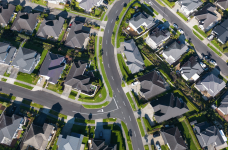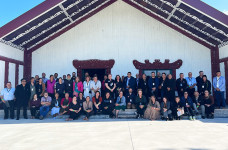Factsheet
Rotorua Housing Accord
The Rotorua Housing Accord (the Accord), signed in December 2022, is a commitment between Government, Rotorua Lakes Council and Te Arawa Iwi to work together to build a better housing and urban future for Rotorua.
With considerable progress having been made, during 2024, to improving housing outcomes in Rotorua, for example, considerable reduction in Contracted Emergency housing numbers, the Accord is being reviewed to reflect changed priorities and commitments.
The signatories to the Accord - Te Arawa, the Crown and the Rotorua Lakes Council - remain committed to working together to ensure positive housing outcomes for Rotorua.
Rotorua is experiencing significant housing challenges
Rotorua has experienced strong population growth in recent years, but new housing supply has not kept up. Rotorua’s population grew by about 9000 people between June 2013 and August 2022, but only 1600 homes were consented – and fewer completed.
This has resulted in rising house prices and increased rents, with median house prices rising by 148 per cent from June 2013 to June 2022 (compared to 113 per cent nationally), and median weekly rents increasing 104 per cent during the same period (compared to 59 per cent nationally).
While homeowners have seen an increase in the value of their home, renters have experienced rising rental costs and first home buyers have needed to save for larger deposits. Because of this, an increasing number of individuals and whānau have found themselves homeless and reliant on emergency housing.
There have been significant barriers to building more homes in Rotorua, including:
- a restrictive district plan and infrastructure constraints
- geotechnical issues adding to development costs, and
- the rising cost of construction and now interest rates affecting the profitability of developments.
The gap between local incomes and the cost of new housing has widened over time, leaving a persistent gap between the cost of building new homes and what individuals and whānau can afford.
The Accord will support community wellbeing
The Accord brings together the collective insights, capability, and experience of Te Arawa, the Crown and Council, combined with the resources of the Crown and Council to:
- reduce the use of emergency housing in Rotorua to near zero as soon as possible
- ensure appropriate emergency housing options are available for those with urgent housing need from Rotorua
- ensure quality delivery of care and well-being services to individuals and whānau residing in emergency housing accommodation
- mitigate the unintended adverse social, cultural, economic, and environmental impacts emergency housing has had on the Rotorua community
- ensure the safe transition of individuals and whanau exiting emergency housing accommodation with appropriate support provisions to maintain independent living, and
- address the chronic housing shortage in Rotorua by increasing the housing supply.
The Accord will focus on:
- care, wellbeing, and management of emergency housing, and
- increasing housing supply.
The Accord will increase the supply of houses
The Accord will increase housing supply in Rotorua, by:
- building a pipeline of public and affordable housing, including planning and infrastructure requirements, that will meet Rotorua’s current and future demand for housing
- growing the overall housing supply
- the Crown and Council actively supporting those Te Arawa Iwi, hapū and lands trusts and incorporations that wish to participate in housing supply to do so, and
- ensuring new infrastructure and housing supply will be responsive to demand, and provide for the long term social, cultural, environmental and economic wellbeing of Rotorua and its people.

Significant work completed
In 2021, the Rotorua Housing Taskforce was established to develop and implement immediate, short-term solutions to improve conditions for whānau receiving Emergency Housing Special Needs Grants (EH-SNGs), while permanent housing solutions were developed.
The Accord will build on the progress of this collaborative partnership between Rotorua Lakes Council, Ministry of Social Development (MSD), Te Tūāpapa Kura Kāinga – Ministry of Housing and Urban Development (HUD), Kāinga Ora – Homes and Communities (Kāinga Ora), and Te Puni Kōkiri, with support from Te Arawa and Ngāti Whakaue.
We are already making progress in speeding up development, with 390 new dwelling consents issued by the council in the year to October 2022, compared to 64 consents in the year to June 2014.
Work is underway to address barriers to building more homes in Rotorua, including by:
- central government making significant investments in infrastructure, including $55 million to enable residential developments from the shovel-ready fund, and $84.6 million for stormwater improvements through the Infrastructure Acceleration Fund, and
- applying the Medium-Density Residential Standards to increase housing development opportunities across the Rotorua urban area.
- Housing for Everyone – Plan Change 9 proposes high density residential zone close to the city centre and more enabling provisions for papakāinga.
Kāinga Ora has around 300 public homes under construction or planned for delivery by the end of 2024, such as:
- Ranolf and Malfroy – 37 homes completed in 2023 and a further 24 homes planned from late 2024
- Quartz Ave – 42 public homes completed by June 2023
- Pukuatua Street – 16 public homes planned at the former language school
- Owhata Road, former Rotorua Arterial Route land – around 50 public homes planned
- Around 20 smaller projects, including redevelopment of existing public housing, to deliver more than 100 new public homes.
As well as public homes built by Kāinga Ora, the following public housing developments are also underway:
- Ngāti Uenukukopako – 17 homes in partnership with Habitat for Humanity. This project was supported by a $4.2 million grant through He Kūkū Ki Te Kāinga.
- Emerge Aotearoa will lease 14 new build public homes within the Mountainview Green development that also includes 35 KiwiBuild Homes.
Government has been working closely with several iwi groups to progress housing developments to increase supply of public and affordable housing by, for and with Māori.
This work has resulted funding through Whai Kāinga Whai Oranga, including funding for:
- Ngāti Whakaue Tribal Lands Manawa Gardens Development, with $19.8 million of funding for infrastructure to enable development of 80 homes and to deliver 20 affordable rentals.
- the Trustees of Owhata 2B, for capability to support resource consents for 93 homes on Te Ture Whenua Māori land.
In 2021, the Rotorua Housing Taskforce implemented three key initiatives to support improving the environment for whānau receiving Emergency Housing Special Needs Grants (EH-SNGs), and the wider community, including:
- establishing Te Pokapū – Rotorua Housing Hub, a community-led housing hub, which takes a kaupapa Māori approach to assessing the housing need of individuals and whānau, and referring them to the right agencies and services
- contracting motels for emergency accommodation for families and whānau with children, and
- providing wraparound social support services for families and whānau in contracted emergency housing, and improved support for people receiving EH-SNGs.
We are already seeing positive results of this work, with the number of motels used, the number of people in motels, and the number of people waiting for a public home decreasing over time. This reduction includes people in contracted emergency housing, transitional housing, COVID-19 motels, and the number of EH-SNGs.
An evaluation of whānau experiences in contracted emergency housing
In 2022, HUD commissioned Te Paetawhiti Ltd & Assoc. to complete an independent evaluation of whānau experiences in Contracted Emergency Housing.
Thirteen motels in Rotorua are contracted by HUD with wrap-around support for whānau and attendant security services. Placement of whānau into the contracted motels is facilitated through the Ministry for Social Development (MSD) and the Rotorua Housing Hub – Te Pokapū.
In total, 91 whānau representing 115 adults and 154 children and 35 stakeholders from local and central government agencies, social services and moteliers contributed to the evaluation. Since the majority of whānau living in contracted emergency motels in Rotorua identified as Māori, the evaluation approach and design was informed by kaupapa Māori theory, principles and practices.
The findings from the evaluation are intended to inform decisions on how to improve whānau experience in emergency housing, as well as emergency housing policy.
Rotorua temporary housing dashboard
To track the progress of the Rotorua Housing Accord toward reducing use of emergency housing as soon as possible, we report monthly on the use of temporary housing options in Rotorua, including EH-SNGs, Contracted Emergency Housing, COVID-19 and transitional housing motels.

